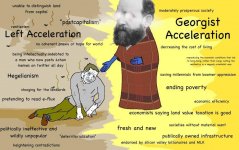The notion that all taxes could be replaced by a single land value tax, whereby the state would presumably fill the role as the universal landlord (although the state assuming this role isn't quite necessary - could possibly be filled by smart contracts, but thats still super theoretical), is certainly very enticing. But as I recall, nowhere in P&P did George get into practical/operational detail about assessing land value (as a function of social/industrial proximal development, as I think he implies).
Then again, I know certain jurisdictions, in the US and abroad, have implemented land value taxes inspired by Georgist ideas (he was apparently quite popular in his day), but I haven't looked into them, nor do I know their success rates in terms of minimizing economic disparity (not that success would necessarily be so causally linear there).









